



The State of Urban Manufacturing: Baltimore City Snapshot is the first study to explore the challenges and opportunities facing Baltimore City’s ‘maker economy.’ Based on a survey of nearly 100 business owners in Baltimore’s light-manufacturing sector, the report seeks to characterize the sector by company size, ownership, revenue, product types, and more. It also explores the barriers to growth as identified by the business owners themselves, and provides recommendations to address those barriers.
The State of Urban Manufacturing Study (SUM) is a project of the Urban Manufacturing Alliance (UMA), a national non-profit dedicated to advancing urban manufacturing in U.S. cities. In addition to Baltimore, SUM includes snapshots of five other U.S. cities: Philadelphia, Detroit, Milwaukee, Portland, OR, and Cincinnati. The same survey tool was deployed in all six cities, allowing for comparison across them. In Baltimore, UMA partnered with Made In Baltimore to develop and distribute the survey tool, convene focus groups of business owners and service providers, and author the final report. The Abell Foundation supported that work.
Some key findings of this report include:
The report will be a tool to guide Made in Baltimore programs and recommendations in the coming months and years. It will serve as a baseline for Baltimore’s maker economy and enable stakeholders to track key ‘vital signs’ of this sector in the years to come.
You can download the Baltimore City Snapshot here.
Photo courtesy of Andy Cook. A trainee at Made in Bmore Clothing operates a computer-controlled embroidery machine at their facility in Port Covington.